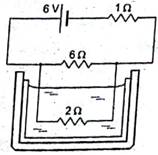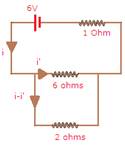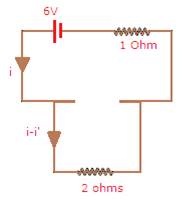The 2.0 Ω resistor shown in figure is dipped into a calorimeter containing water. The heat capacity of the calorimeter together with water is 2000 J K–1.
(a) If the circuit is active for 15 minutes, what would be the rise in the temperature of the water?
(b) Suppose the 6.0 Ω resistor gets burnt. What would be the rise in the temperature of the water in the next 15 minutes?

Given-
Resistance - 2.0 ΩΩ
heat capacity of the calorimeter together with water = 2000 J K–1

Looking into the circuit the effective resistance of the circuit,
2.0 Ω in parallel with 6.0 Ω and this combination in series with 1.0 Ω
![]()
![]()
Now, current i through the circuit, from ohm’s law-
![]()
![]()
![]()
Let take i’ as the current through the 6 Ω resistor.
Then, applying KCL, the algebraic sum of current entering and leaving a node is zero and from ohm’s law, we can write -
![]()
![]()
![]()
![]()
![]()
![]()
(a) Heat generated in the 2 Ω resistor, using Joule’s Heating effect
![]()
from (1) and substituting values
![]()
![]()
Given that the heat capacity of the calorimeter together with water is 2000 J K−1
Which means , 2000 J of heat raise the temp by 1 K.
Then, 5832 J of heat raises the temperature of water by
![]()
(b) When the 6 Ω resistor burn out, the effective resistance of the
circuit will become –

![]()
Current through the circuit,
![]()
Heat generated in the 2 Ω resistor, using Joule’s Heating effect
![]()
![]()
Given that the heat capacity of the calorimeter together with water is 2000 J K−1
Which means , 2000 J of heat raise the temp by 1 K.
So, 7200J will raise the temperature by
![]()